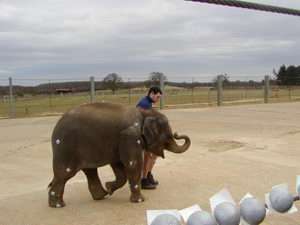Have you ever seen an elephant... run?

If an elephant is thundering towards you at 15mph you are probably not too concerned with the finer points of biomechanics or the thorny question about whether they are truly running or not. But for researchers, understanding these points and getting a clearer picture of how elephants move their seven tonnes of bulk at speed offers the potential to improve animal welfare, inform human biomechanics and even help in the design of large robots.
Dr John Hutchinson, a research leader at the UK's Royal Veterinary College (RVC), has already shown that, contrary to previous studies and most popular opinion, elephants moving at speed appear to be running. Now with funding from the Biotechnology and Biological Sciences Research Council (BBSRC) his team is using Hollywood-style motion capture cameras combined with MRI and CT scans of elephants to build 3D computer models of elephant locomotion to show the forces and stresses at work on muscles, tendons and bones.
The research team has been working with elephants at UK wildlife and safari parks and will shortly travel to Africa and Thailand to study wild animals. Fifteen temporary markers are placed on the elephants' joints and the animals then move past a motion capture camera, recording at 240 frames per second, at varying speeds. Back in the lab the researchers can then use the footage to reconstruct the rotations of the elephants' joints on a computer, creating a 3D stick model of the animal.
The computer models are being used to establish how limb structure relates to elephant locomotion and to determine finally if elephants really can run – or in scientific terms, at some point do they have all their feet off the ground at the same time? Dr Hutchinson said: "We are particularly interested how elephants coordinate their limbs and working out which joints contribute most to the length and frequency of their steps. In examining whether elephants truly run or not we need to understand what limits their top speed. Is it the tendons and muscles having to withstand the impact of 7 tonnes of elephant or is it something else?"
This is not a trivial question as Dr Hutchinson explained: "A better understanding of elephant biomechanics offers the possibility for real animal welfare improvements. By developing ways to spot slight changes in gait and joint movements in captive elephants we can catch the early onset of osteomyelitis and arthritis. If these conditions are not treated early they can result in an elephant being put down."
The research also informs other biomechanical studies as the elephant leg has surprising similarities to our own. Humans have the same structure of a straight leg with a long thigh and short foot. Studies of animal locomotion are also key to the design of effective walking robots. By understanding how evolution achieved the joint structure and limb coordination of an animal as large as an elephant we will be better able to construct our own man-made walking robots.
Source: Biotechnology and Biological Sciences Research Council















